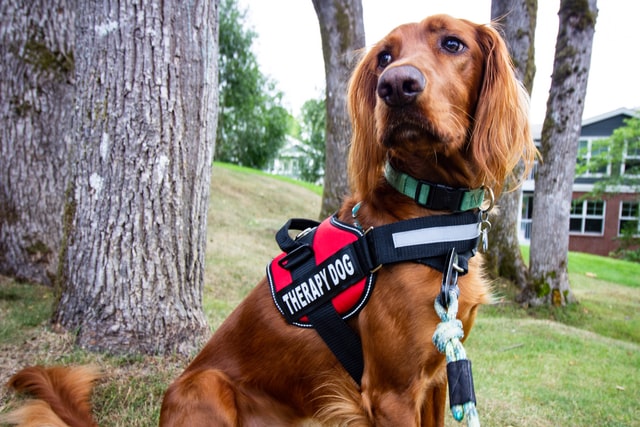We Love animals
What is your favorite animal?
Most people love animals and many consider their pets family and treat them like their kids.
Some time ago, I wrote a post about how pets can be beneficial for mental health. It’s a topic I love writing about and I keep discovering new ways that animals can be part of our healing journey.
That’s how I found out about Animal Assisted Therapy.
On the podcast, I spoke with Charlotte Erika Walker, an Interspecies Healer and Animal Communicator who helps humans and their companion animals holistically through physical, emotional and spiritual enhancement and support in a symbiotic way.
“Time spent with cats is never wasted.”
- Sigmund Freud
What does an Interspecies Healer do? Well, she helps facilitate the communication between companion animals and their humans, so both can thrive and heal together. Pets have a very unique connection to their human guardians and the healing works both ways.
Pet Benefits for Mental Health
Owning a companion animal comes with many amazing benefits and a lot of them can be physically measured. Studies have been done for decades on how pet ownership affects humans. And the results are very positive.
McConnell et al. (2011) mentions research that shows pet owners are less likely to die within one year of having a heart attack than those who do not own pets. And elderly Medicare patients with pets had fewer doctor visits than similar patients without pets. There is also an improvement in loneliness and an increase in physical activity, especially with dogs that need regular walks.

People with spinal cord injuries or traumatic brain injury who were given a service dog showed well-being improvements within 6 months in contrast to wait-listed individuals (McConnell et al., 2011). But, it is important to note that all of these examples involved participants with very serious health issues.
Can pets have a positive psychological impact on pet owners without such serious health issues? Some studies do indeed suggest that pet owners enjoy greater wellbeing than non-pet owners (McConnell et al., 2011). This includes more self-esteem, more self-respect, less anxiety, less depression, less loneliness, less stress, and greater happiness.
In other words, owning a pet can have a positive effect on your mental health.
Animal Assisted Therapy
And how about Animal Assisted Therapy? As Charlotte Erika explained in the episode, her visits to nursing homes with her therapy dog, Bruce, made a huge difference for the residents. Visiting a hospital or nursing home would be an animal-assisted activity and allows residents with illnesses to connect with therapy animals.
Animal-assisted therapy involves including animals, which are very often dogs or horses, in a treatment plan (Nimer & Lundahl, 2007). There have also been examples of reptiles and rats being used as therapy animals with great success. The kind of animal and the type of therapy depends on what you are looking to address. It’s usually best to set up multiple shorter sessions spaced out over the month, instead of one long session.

You could include animals in physical therapy, if you are recovering from an injury. Animals can also be part of mental health therapies to reduce anxiety and loneliness (Nimer & Lundahl, 2007). Animals have often been included in working with autistic spectrum symptoms, PTSD, ADHD, and addictions. Many of these interactions have been proven to help with physical health and happiness.
And you can definitely include your own companion animals. Just a short time spent with your dog (or other pet) each day can lower your blood pressure and increase a sense of positive wellbeing. This kind of “emotional hygiene” can have a trickle down effect on your mental health and help shape and reinforce positive behaviors every day (Odendaal, 2000).
The Professional ANIMAL Therapist
The difference between spending time with your own pet and working with a certified Animal Assisted Therapy provider is the structure. At home, you just cuddle up with your dog or spend some time playing with your cat. The time is unstructured and your pets are part of your everyday lives. You take your dog for walks, you clean the cat litter. It is all part of your regular daily routine.
You still get the benefits of spending time with an animal; however, a professional provider would guide your sessions to achieve a certain goal. If you are looking to reduce anxiety, you would definitely feel some benefits while petting your dog. A therapist would structure each session to include anxiety reduction, so that this could become part of your daily coping strategy.

While spending time with your pet already provides benefits for your mental health, adding Animal Assisted Therapy could take your healing journey even further. It could also be a great option, if you are unable to keep a pet because of your living situation or a disability. You would not have to care for your therapy animal at your home, but you could spend time together to bond and heal.
I have met therapists who bring their therapy animals to the home or clinic. This works really well for dogs, for example. And I have met others who have set up centers where people can benefit from animal assisted therapy. Usually, bringing a horse to your house would be complicated. So, it’s a better option to do horse therapy in a setting specifically designed for that. Many therapy centers are located on farms or larger properties and provide lots of space to spend time with the therapy animals.
The Takeaway
If you want to include animals in your healing journey, Animal Assisted Therapy could be a wonderful option. Whether you start by spending time with your own pet or work with a professional provider, you will see the positive benefits of connecting with animals in your life.

And if you are looking for online options, make sure you check out our podcast episode with Charlotte Erika Walker. She is in the process of establishing online options for people who cannot physically interact with a pet or animal.
Animals innately understand what you need and connect in a special and unique way to help.
Add the healing power of animals to your own healing journey!
Sources
McConnell, A. R., Brown, C. M., Shoda, T. M., Stayton, L. E., & Martin, C. E. (2011). Friends with benefits: On the positive consequences of pet ownership. Journal of Personality and Social Psychology, 101(6), 1239–1252. https://doi.org/10.1037/a0024506
Nimer, J., & Lundahl, B. (2007). Animal-Assisted Therapy: A meta-analysis. Anthrozoös, 20(3), 225–238. https://doi.org/10.2752/089279307x224773
Odendaal, J. (2000). Animal-assisted therapy — magic or medicine? Journal of Psychosomatic Research, 49(4), 275–280. https://doi.org/10.1016/s0022-3999(00)00183-5
https://thejornipodcast.com/episode-3-animal-assisted-therapy-with-charlotte-erika-walker
